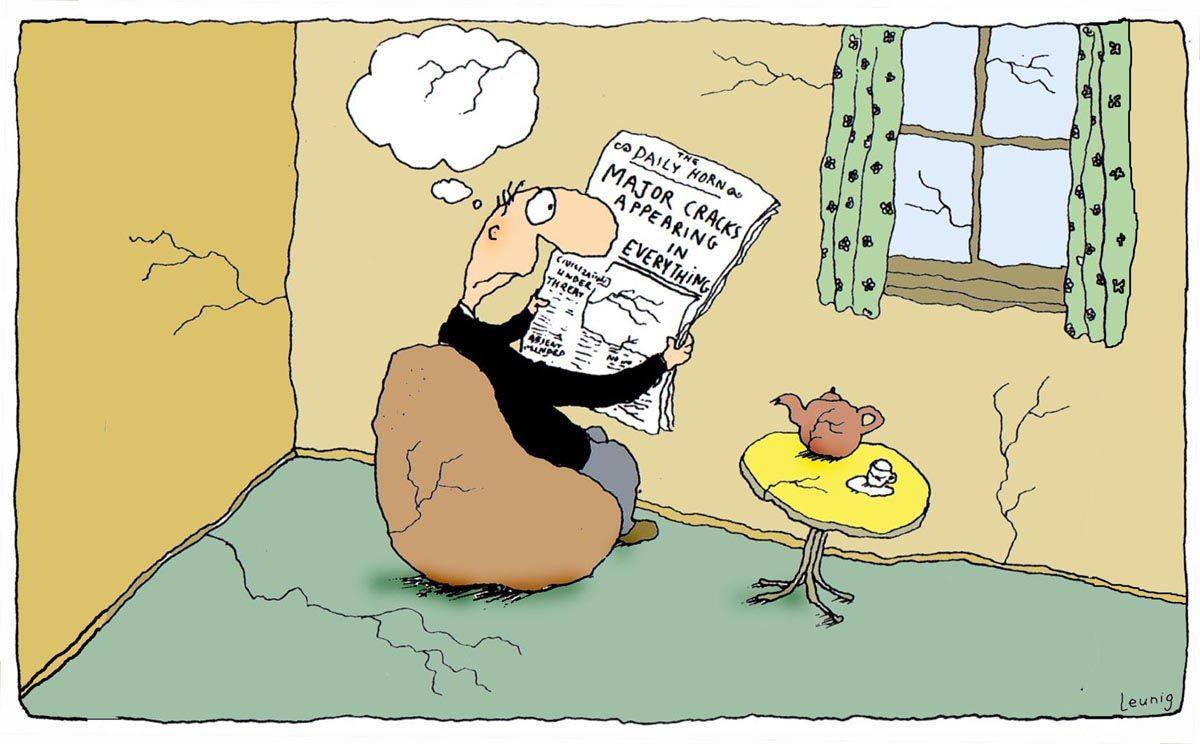It is all too easy to get caught up in current events today, with the U.S. president scheming to discredit his own country’s election results, COVID-19 resurgent in many countries, social upheaval and natural disasters continuing to worsen with each passing year, to name but a few issues screaming for immediate attention.
But there is danger in letting our eyes be drawn too often, for every one of these current events is the product of underlying trends, and it is these that are more likely to reward intervention. Indeed, without such attention to the underpinnings, current events will only get more and more overwhelming until…
…well, until what? The ever-insightful Nate Hagens’ outstanding piece “No Matter Who Wins” is a powerful reminder of the bigger picture, and where our society’s trends are headed…
The natural question, then—cartoons notwithstanding!—is what might we do? What kind of interventions might we pursue to change the profoundly undesirable trajectory we are on?
And this leaves me reflecting on the legacy of my late mentor David Fleming, as we approach the 10th anniversary of his death on November 29th. Both because that is the very question that consumed the final decades of his life, and because the insights he unearthed have been finding ever-wider audiences in this first decade since.
To pick a few highlights, last year BAFTA-winning director Peter Armstrong drew inspiration from his ideas and influence to create the feature film The Sequel: What Will Follow Our Troubled Civilisation?, sales of his award-winning posthumous books continue to rise year-on-year, and the wondrous LeanLogic.online launched just this week! I was also shocked a month or two back to hear his book Lean Logic: A Dictionary for the Future and How to Survive It given a shout out by BBC Radio 6 DJ Marc Riley, thanks to a new band who’ve taken Lean Logic as their name!
'Safe In A Dream', on BBC Radio 6
For now, the question is what is it in David Fleming’s work that all these myriad good folk are finding so inspiring?
Well, to vastly over-summarise his beautifully-written life’s work, two things:
- Defend and restore wild nature. This is, after all, the economy on which all others depend.
- Defend and restore relationships not mediated by money: the ‘informal economy’. This is the economy of what we love—of the things we naturally do when not otherwise compelled—of music, play, family, volunteering, activism, friendship and home.
These are so radically different from the priorities of every mainstream economist that it feels strange to call David by the same term but, as he points out, the weight of history is on his side. Nature and the informal economy are what supported communities for hundreds of thousands of years before the coming of the short-lived market economy, and they are what will have to support lives again as its end continues to unfold.
As theatre maker and community activist Lucy Neal (who also teaches on our Fleming-inspired online course) said during her exclusive interview discussed below, it’s refreshing to find reconfirmed in his work the essential importance of “warm spaces, the role of conviviality, the role of hospitality, of being at peace together.”
For indeed it is here, in such culture and community building, that the really important work of today is taking place. The good everyday work of getting to know people and wild places, enjoying time together and helping to provide for each other’s needs – the very things, in fact, that the monetary economy tells us we don’t have time for, and that so many desperately miss. As I have written before, David’s work makes crystal clear that this is not merely some quaint and obsolete shared longing, but rather an absolute practical priority.
That, in my estimation, is why so many are latching on to his framework for improving our future, and why it makes sense especially in times when national and global leaders are leading us only towards regrets and recrimination.

So I’ve pulled together the below programme, wherein we’ll hear from Fleming fans new and old, including no fewer than three bands with music inspired by his writing! And the whole event—from sunrise to sunset—very much in the spirit of what I wrote ten short years ago, on the day of his death,
thank you David, for all you did for me, and for our world
David Fleming: 10 Years on, Celebrating His Legacy
Sunday 29th November 2020
Full recording now available below
Sunrise, 7:00am – Intro/welcome from Shaun
7:05 – ‘Safe In A Dream’, music video by new band Lean Logic
7:10 – Reflections from the recent ‘Surviving the Future: Conversations for Our Time’ course
7:55 – ‘The Logic of Lean’, song by Deccan Traps
8:05 – Rob Hopkins and Shaun Chamberlin discuss Fleming’s legacy (Schumacher College recording)
9:35 – Jonathon Porritt and Shaun Chamberlin discuss Fleming’s legacy (Oxford University recording)
11:20 – Exclusive interview with Lucy Neal: Fleming’s influence on her life and work
11:55 – David Fleming 2006 lecture: ‘A Practical Guide to the Energy Descent’
13:25 – David Fleming’s final interview, November 2010
14:40 – Film, The Sequel: What Will Follow Our Troubled Civilisation?
15:40 – Reflections from Shaun and Philip Ackerman-Leist
Sunset, 16:25 – ‘The Seed Beneath The Snow’, song by Seafern
The full day’s events:
For clickable links to jump directly to each section,
view the recording on the Dark Optimism YouTube channel






Hope this will be recorded, since I love on the Pacific coast.
Hi John, good to hear from you! Yes, it will certainly be recorded, and apologies to those for whom the timings are tricky.
We haven’t done a Youtube Premiere before, but you should be able to join events whenever you’re up and about, and then I’ll figure out how to make the earlier part available to watch later!
Edit – I’m happy to confirm that today’s full event is now available here.
That link will take you to the full event video on YouTube, where you can click on “SHOW MORE” in the description under the video to reveal direct links to jump to each section of the content.
David was ne of my very closest friends, so I really knew him, and I am praying – vainly – that people remembering him more deeply. Many comments on his life have been so trivial and he would have loathed the simplistic echoes which so many of them are.
Hello John – I met you and David and many others in the days when Canon Bob Smith – St Bob of affectionate memory – was at St John’s, Downshire Hill, quietly getting on with his remarkable work of bringing such disparate folks as we all were together in such a quietly memorable and deeply enjoyable way. That little local congregation was a community, living and being what Lucy Neal writes of – a warm, hospitable, convivial space, where people could be at peace together. And where, like you, I got to know David well. There’s surely some residue of Bob in David’s work.
Gillian! How good to hear from you. and for you to respond to my typo-mess of a message! I live in NYC now and am up to my eyes with work and my website Windsor-Cunningham.com I’ve met Peter McLaren when over in London and reminisced with him on the extraordinary St Bob. But with the passing of the Bakers, – and my no longer living there – I’ve kept up little contact. How are you? Love, John
Really enjoyed hearing the small bits of today’s offering that I was able to. Thank you for making this.
Very much hoping to get access to a recording of the whole enchilada 🙂
Hi Vivianne, with the live event just having ended, I’m happy to confirm that the whole enchilada is now available at the same link.
When I get a moment over the coming days I’ll add direct links to each section into the description under the video, but in the meantime it’s not too hard to skip through manually. May it bring you much pleasure!
[…] What on Earth to do in such times? Well, to quote David Fleming, […]